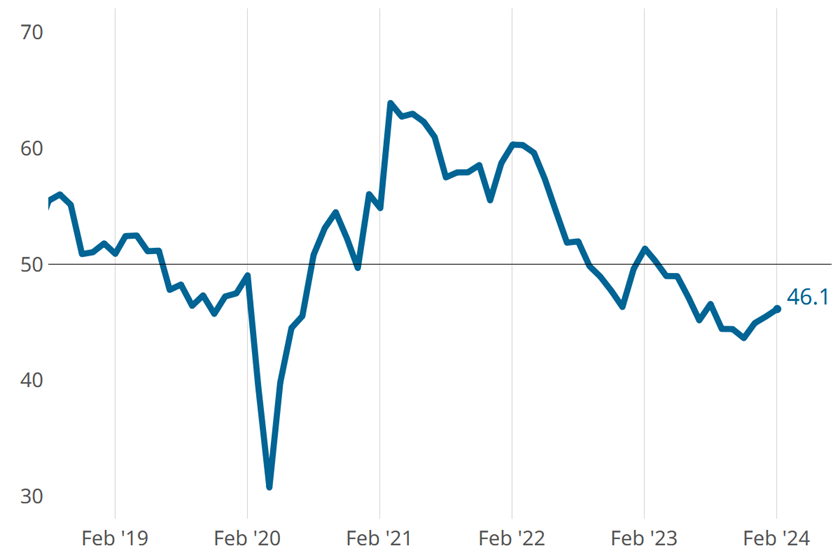Even in Good Economic Times, Are You Still Hungry?
Through the first half of 2019, the U.S. economy did quite well, but don’t be complacent.
#economics
Through the first half of 2019, the U.S. economy did quite well. GDP growth of 3.2%, historically low unemployment and, even with a dip in manufacturing growth, that sector remains strong.
For many finishers, the top line remains solid. Bills are paid on time, debt is being reduced, the banker is happy, owners are content and questions at board meetings aren’t nearly as difficult. We start to think it’s all because of us. We review year-over-year sales growth, improvements in gross margins, solid cash flows and mentally—if not out loud—we pat ourselves on the back for our leadership prowess, the shear genius in our ability to run our businesses. Life is good.
Thoughts go back to the time a mentor saw this behavior in me. “Don’t rest on your laurels,” he said. “Oh, I won’t,” I responded, before sneaking off to look up the word laurels.
The truth is, when things are good, it’s easy to take all the credit and even become a bit complacent. But business cycles are real. Right before the dot-com bubble burst 20 years ago and just before the 2008 financial crisis, it felt as if the economy would be hot forever. The finisher who avoids the temptation to “rest on their laurels” now will reap the benefits when the inevitable downward cycle kicks in.
In other words, are you still hungry? In spite of recent solid financial performance, are you still running your business like you did when you were scrapping for your next order, sweating payroll and trying to keep the bankers satisfied with your efforts?
When we were hungry, every customer issue or complaint was treated as an emergency. We fretted over every missed customer commit date, we relentlessly sought out opportunities to improve throughput, reduce lead times and maximize yield. Quality issues were not allowed to become chronic because we addressed them immediately, rooting out the causes and correcting them.
When we were hungry, we didn’t wait even a single day to tackle a slip in performance signaled by poor operating metrics. Downtime was treated like Armageddon, and worries about maintenance issues woke us up at 3 a.m.
When we were hungry, every sales lead was hunted down promptly and every prospect who showed the slightest bit of interest was pursued immediately. Every customer presentation was treated as a do-or-die event. We did our homework, prepared meticulously, asked great questions in our sales presentations and hung on the customer’s every answer. When a customer requested a quote, it was responded to immediately to ensure our proposal was the first one to land in the customer’s quote file and, thus, the one most likely to be used in their quote to their customer.
When we were hungry, every order a customer sent to a competitor felt like a slap in the face, and losing even a small repeat customer to the finisher across town made us sick to our stomach. Every penny was treated like a gold medallion. We tracked every expenditure, negotiated every purchase and hunted down spending variances with a vengeance.
When we were hungry, our suppliers dreaded approaching us with a price increase, knowing we would fight them tooth and nail, request proposals from their competitors and find ways to reduce our reliance on their products in protection of our income statements.
When we were hungry, every rack was full of parts, every barrel loaded to the max and lines were running at top speed to squeeze out every drop of excess capacity and, thereby, keep costs in check. We obsessed over returns-on-investment on capital equipment purchases, ensuring any potential purchases were justified by their payback periods before we expended the cash, and maniacally measuring the actual payback after the investment was made.
When we were hungry, we only added team members if we could prove they could add direct value to the business. When we were hungry, every one of our teammates was held to account on a daily basis, and those not contributing to the performance of the business were moved along without hesitation. When we were hungry, we wouldn’t think of adding an additional shift unless all of our lines were already running at maximum capacity. When we were hungry, everything we did mattered.
Remember when we were hungry? If reading this made you uncomfortable, maybe it’s time to get hungry again.
RELATED CONTENT
-
Surface Finishing and the Aerospace Supply Chain
The state of aerospace business in the finishing industry.
-
2020 Top Shops Benchmarking Survey Results for Electroplating & Anodizing
North American Market Shows Mixed Results for the 2019 Reporting Year
-
Powder Coating PVC?
Question: I have a product that I am trying to get to market.
















